IKC101 Assessment 2: Kinship, Dreaming, and Economic Organization
VerifiedAdded on 2023/06/15
|6
|1627
|52
Essay
AI Summary
This essay provides an overview of Indigenous Australian cultures, focusing on the interconnectedness of the Dreaming, kinship systems, and economic organization. The Dreaming is presented as a worldview that provides a framework for understanding the universe and one's place within it, offering laws, rules for living, and an explanation of creation. Kinship is explored as a system of social relationships based on blood or marriage, governing roles, obligations, and providing a sense of identity and belonging. The essay also examines the traditional subsistence-based economic organization of Indigenous Australians, including hunting, gathering, fishing, and exchange, while highlighting the diversity in economic practices across different language groups and the impact of pre-colonial and post-colonial periods. The document emphasizes how these three elements—the Dreaming, kinship, and economic organization—are interwoven to shape the cultural fabric of Indigenous Australian societies. The document is available on Desklib, a platform that provides AI-based study tools and solved assignments for students.
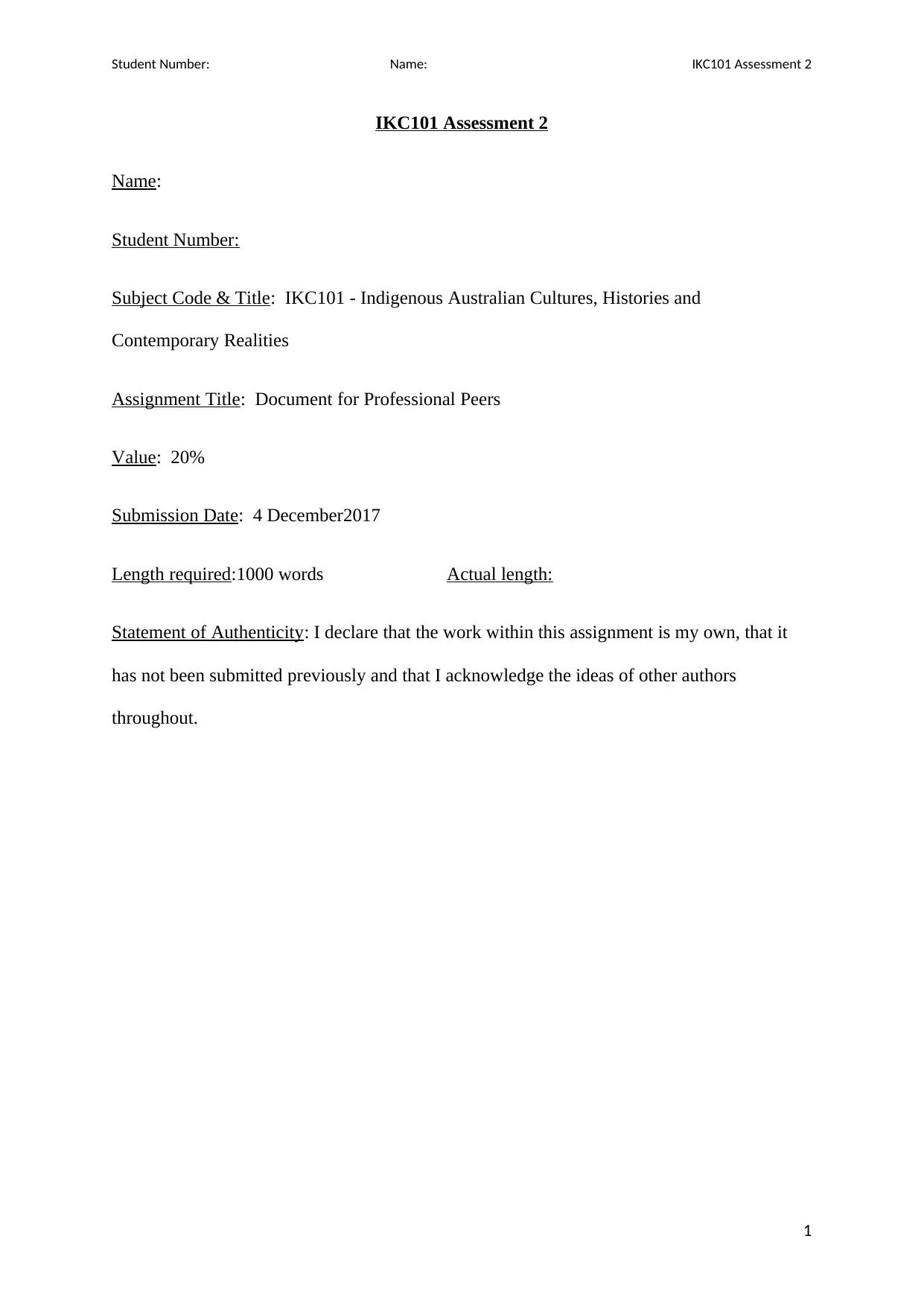
Student Number: Name: IKC101 Assessment 2
IKC101 Assessment 2
Name:
Student Number:
Subject Code & Title: IKC101 - Indigenous Australian Cultures, Histories and
Contemporary Realities
Assignment Title: Document for Professional Peers
Value: 20%
Submission Date: 4 December2017
Length required:1000 words Actual length:
Statement of Authenticity: I declare that the work within this assignment is my own, that it
has not been submitted previously and that I acknowledge the ideas of other authors
throughout.
1
IKC101 Assessment 2
Name:
Student Number:
Subject Code & Title: IKC101 - Indigenous Australian Cultures, Histories and
Contemporary Realities
Assignment Title: Document for Professional Peers
Value: 20%
Submission Date: 4 December2017
Length required:1000 words Actual length:
Statement of Authenticity: I declare that the work within this assignment is my own, that it
has not been submitted previously and that I acknowledge the ideas of other authors
throughout.
1
Paraphrase This Document
Need a fresh take? Get an instant paraphrase of this document with our AI Paraphraser
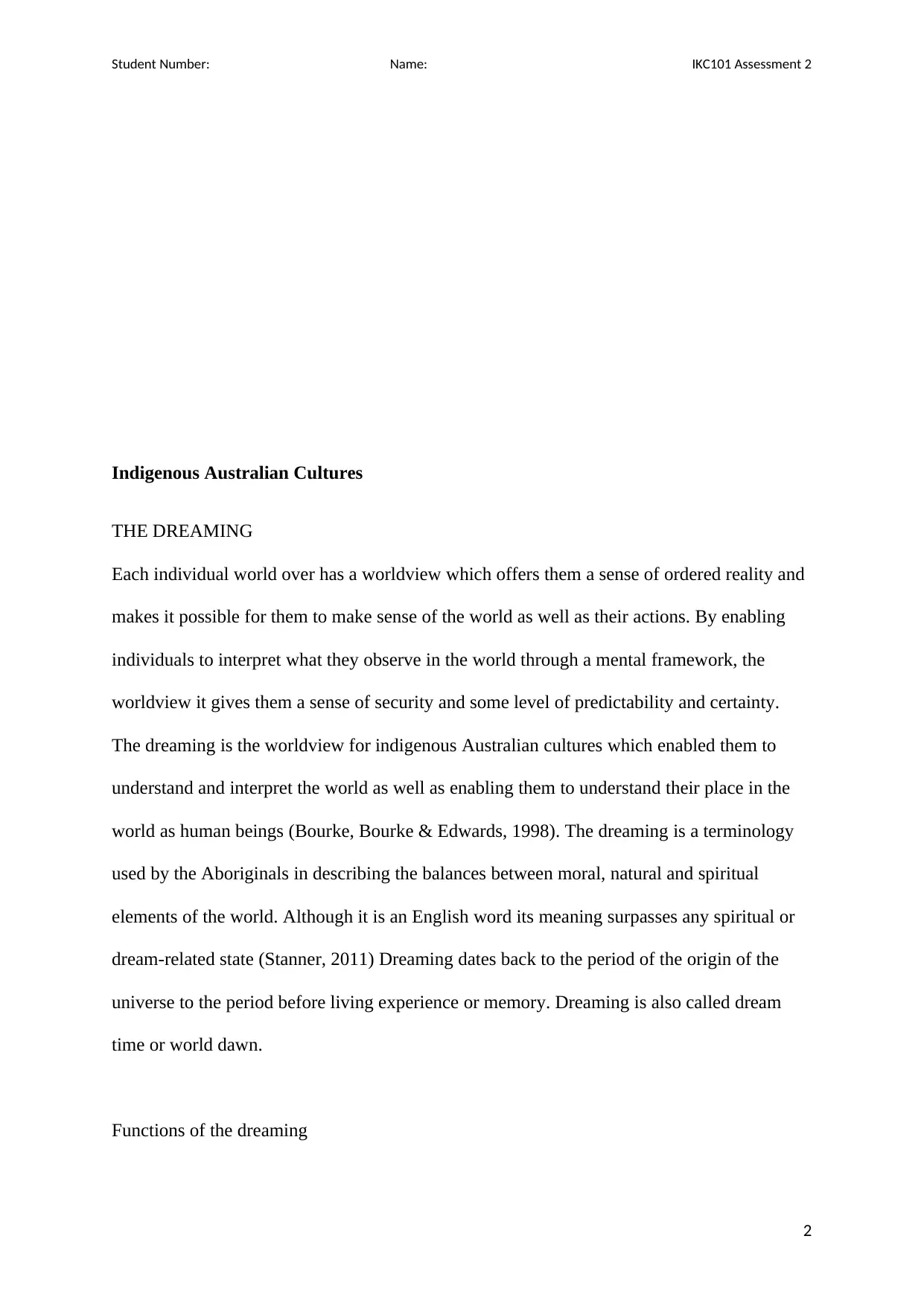
Student Number: Name: IKC101 Assessment 2
Indigenous Australian Cultures
THE DREAMING
Each individual world over has a worldview which offers them a sense of ordered reality and
makes it possible for them to make sense of the world as well as their actions. By enabling
individuals to interpret what they observe in the world through a mental framework, the
worldview it gives them a sense of security and some level of predictability and certainty.
The dreaming is the worldview for indigenous Australian cultures which enabled them to
understand and interpret the world as well as enabling them to understand their place in the
world as human beings (Bourke, Bourke & Edwards, 1998). The dreaming is a terminology
used by the Aboriginals in describing the balances between moral, natural and spiritual
elements of the world. Although it is an English word its meaning surpasses any spiritual or
dream-related state (Stanner, 2011) Dreaming dates back to the period of the origin of the
universe to the period before living experience or memory. Dreaming is also called dream
time or world dawn.
Functions of the dreaming
2
Indigenous Australian Cultures
THE DREAMING
Each individual world over has a worldview which offers them a sense of ordered reality and
makes it possible for them to make sense of the world as well as their actions. By enabling
individuals to interpret what they observe in the world through a mental framework, the
worldview it gives them a sense of security and some level of predictability and certainty.
The dreaming is the worldview for indigenous Australian cultures which enabled them to
understand and interpret the world as well as enabling them to understand their place in the
world as human beings (Bourke, Bourke & Edwards, 1998). The dreaming is a terminology
used by the Aboriginals in describing the balances between moral, natural and spiritual
elements of the world. Although it is an English word its meaning surpasses any spiritual or
dream-related state (Stanner, 2011) Dreaming dates back to the period of the origin of the
universe to the period before living experience or memory. Dreaming is also called dream
time or world dawn.
Functions of the dreaming
2
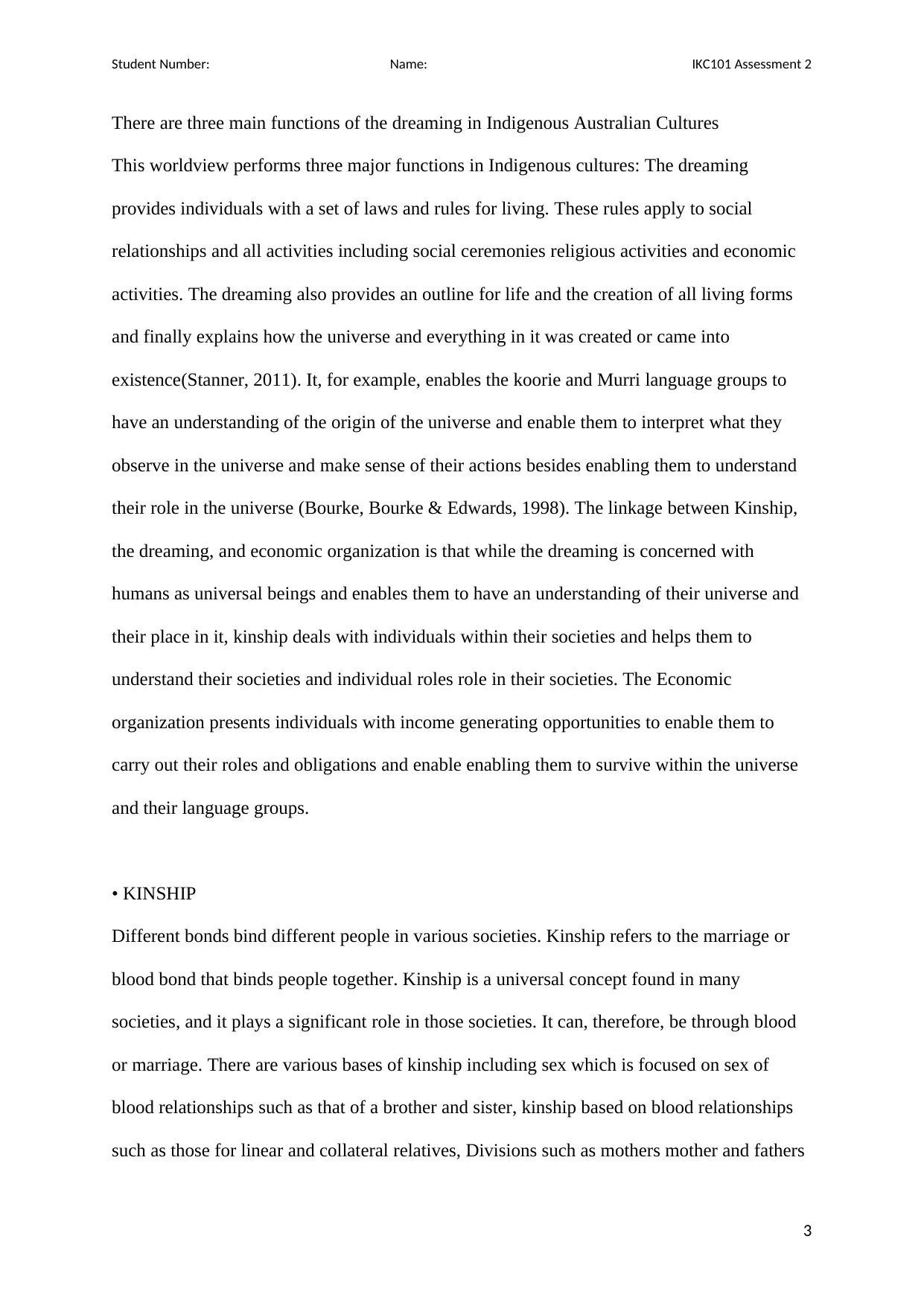
Student Number: Name: IKC101 Assessment 2
There are three main functions of the dreaming in Indigenous Australian Cultures
This worldview performs three major functions in Indigenous cultures: The dreaming
provides individuals with a set of laws and rules for living. These rules apply to social
relationships and all activities including social ceremonies religious activities and economic
activities. The dreaming also provides an outline for life and the creation of all living forms
and finally explains how the universe and everything in it was created or came into
existence(Stanner, 2011). It, for example, enables the koorie and Murri language groups to
have an understanding of the origin of the universe and enable them to interpret what they
observe in the universe and make sense of their actions besides enabling them to understand
their role in the universe (Bourke, Bourke & Edwards, 1998). The linkage between Kinship,
the dreaming, and economic organization is that while the dreaming is concerned with
humans as universal beings and enables them to have an understanding of their universe and
their place in it, kinship deals with individuals within their societies and helps them to
understand their societies and individual roles role in their societies. The Economic
organization presents individuals with income generating opportunities to enable them to
carry out their roles and obligations and enable enabling them to survive within the universe
and their language groups.
• KINSHIP
Different bonds bind different people in various societies. Kinship refers to the marriage or
blood bond that binds people together. Kinship is a universal concept found in many
societies, and it plays a significant role in those societies. It can, therefore, be through blood
or marriage. There are various bases of kinship including sex which is focused on sex of
blood relationships such as that of a brother and sister, kinship based on blood relationships
such as those for linear and collateral relatives, Divisions such as mothers mother and fathers
3
There are three main functions of the dreaming in Indigenous Australian Cultures
This worldview performs three major functions in Indigenous cultures: The dreaming
provides individuals with a set of laws and rules for living. These rules apply to social
relationships and all activities including social ceremonies religious activities and economic
activities. The dreaming also provides an outline for life and the creation of all living forms
and finally explains how the universe and everything in it was created or came into
existence(Stanner, 2011). It, for example, enables the koorie and Murri language groups to
have an understanding of the origin of the universe and enable them to interpret what they
observe in the universe and make sense of their actions besides enabling them to understand
their role in the universe (Bourke, Bourke & Edwards, 1998). The linkage between Kinship,
the dreaming, and economic organization is that while the dreaming is concerned with
humans as universal beings and enables them to have an understanding of their universe and
their place in it, kinship deals with individuals within their societies and helps them to
understand their societies and individual roles role in their societies. The Economic
organization presents individuals with income generating opportunities to enable them to
carry out their roles and obligations and enable enabling them to survive within the universe
and their language groups.
• KINSHIP
Different bonds bind different people in various societies. Kinship refers to the marriage or
blood bond that binds people together. Kinship is a universal concept found in many
societies, and it plays a significant role in those societies. It can, therefore, be through blood
or marriage. There are various bases of kinship including sex which is focused on sex of
blood relationships such as that of a brother and sister, kinship based on blood relationships
such as those for linear and collateral relatives, Divisions such as mothers mother and fathers
3
⊘ This is a preview!⊘
Do you want full access?
Subscribe today to unlock all pages.

Trusted by 1+ million students worldwide
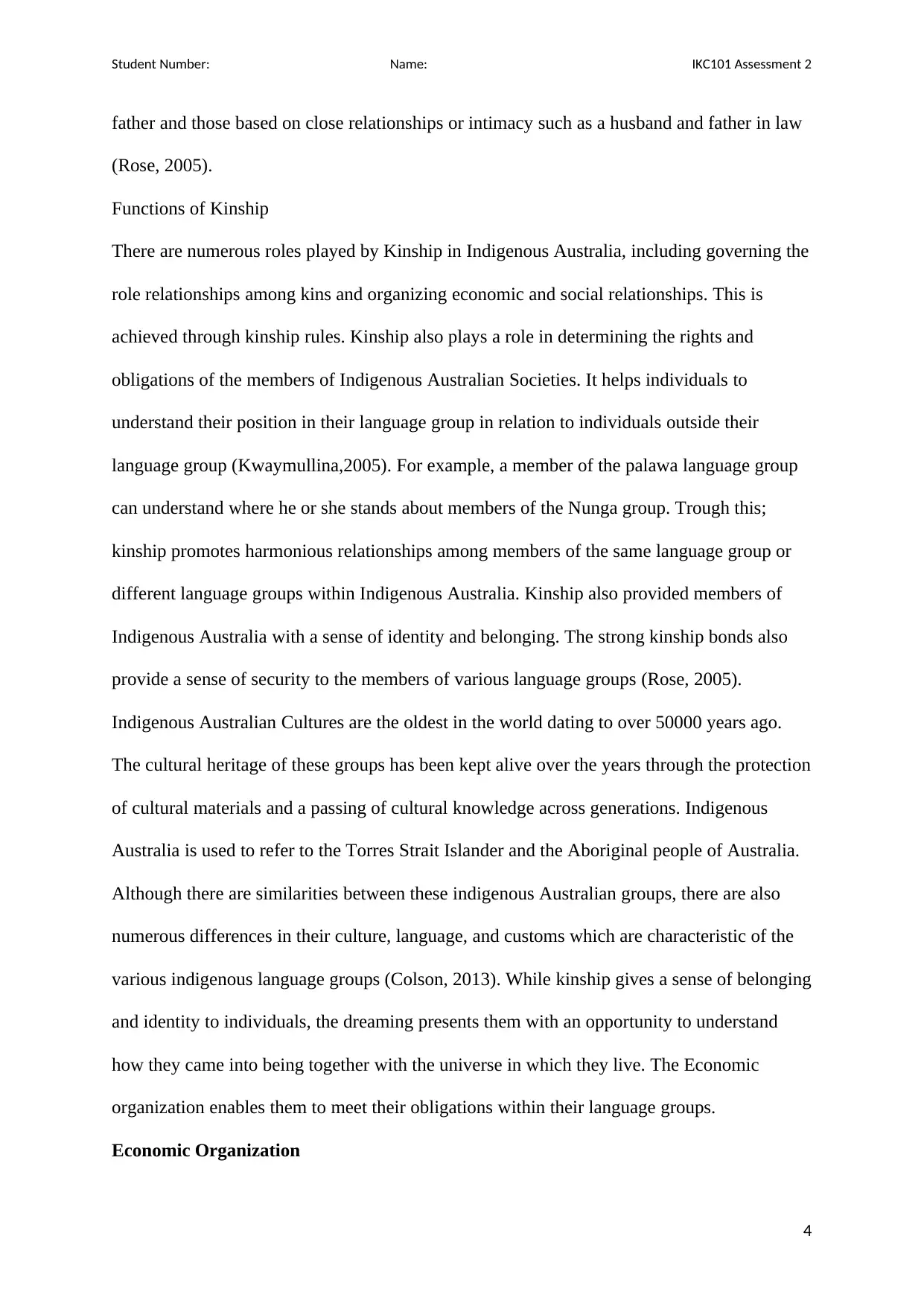
Student Number: Name: IKC101 Assessment 2
father and those based on close relationships or intimacy such as a husband and father in law
(Rose, 2005).
Functions of Kinship
There are numerous roles played by Kinship in Indigenous Australia, including governing the
role relationships among kins and organizing economic and social relationships. This is
achieved through kinship rules. Kinship also plays a role in determining the rights and
obligations of the members of Indigenous Australian Societies. It helps individuals to
understand their position in their language group in relation to individuals outside their
language group (Kwaymullina,2005). For example, a member of the palawa language group
can understand where he or she stands about members of the Nunga group. Trough this;
kinship promotes harmonious relationships among members of the same language group or
different language groups within Indigenous Australia. Kinship also provided members of
Indigenous Australia with a sense of identity and belonging. The strong kinship bonds also
provide a sense of security to the members of various language groups (Rose, 2005).
Indigenous Australian Cultures are the oldest in the world dating to over 50000 years ago.
The cultural heritage of these groups has been kept alive over the years through the protection
of cultural materials and a passing of cultural knowledge across generations. Indigenous
Australia is used to refer to the Torres Strait Islander and the Aboriginal people of Australia.
Although there are similarities between these indigenous Australian groups, there are also
numerous differences in their culture, language, and customs which are characteristic of the
various indigenous language groups (Colson, 2013). While kinship gives a sense of belonging
and identity to individuals, the dreaming presents them with an opportunity to understand
how they came into being together with the universe in which they live. The Economic
organization enables them to meet their obligations within their language groups.
Economic Organization
4
father and those based on close relationships or intimacy such as a husband and father in law
(Rose, 2005).
Functions of Kinship
There are numerous roles played by Kinship in Indigenous Australia, including governing the
role relationships among kins and organizing economic and social relationships. This is
achieved through kinship rules. Kinship also plays a role in determining the rights and
obligations of the members of Indigenous Australian Societies. It helps individuals to
understand their position in their language group in relation to individuals outside their
language group (Kwaymullina,2005). For example, a member of the palawa language group
can understand where he or she stands about members of the Nunga group. Trough this;
kinship promotes harmonious relationships among members of the same language group or
different language groups within Indigenous Australia. Kinship also provided members of
Indigenous Australia with a sense of identity and belonging. The strong kinship bonds also
provide a sense of security to the members of various language groups (Rose, 2005).
Indigenous Australian Cultures are the oldest in the world dating to over 50000 years ago.
The cultural heritage of these groups has been kept alive over the years through the protection
of cultural materials and a passing of cultural knowledge across generations. Indigenous
Australia is used to refer to the Torres Strait Islander and the Aboriginal people of Australia.
Although there are similarities between these indigenous Australian groups, there are also
numerous differences in their culture, language, and customs which are characteristic of the
various indigenous language groups (Colson, 2013). While kinship gives a sense of belonging
and identity to individuals, the dreaming presents them with an opportunity to understand
how they came into being together with the universe in which they live. The Economic
organization enables them to meet their obligations within their language groups.
Economic Organization
4
Paraphrase This Document
Need a fresh take? Get an instant paraphrase of this document with our AI Paraphraser
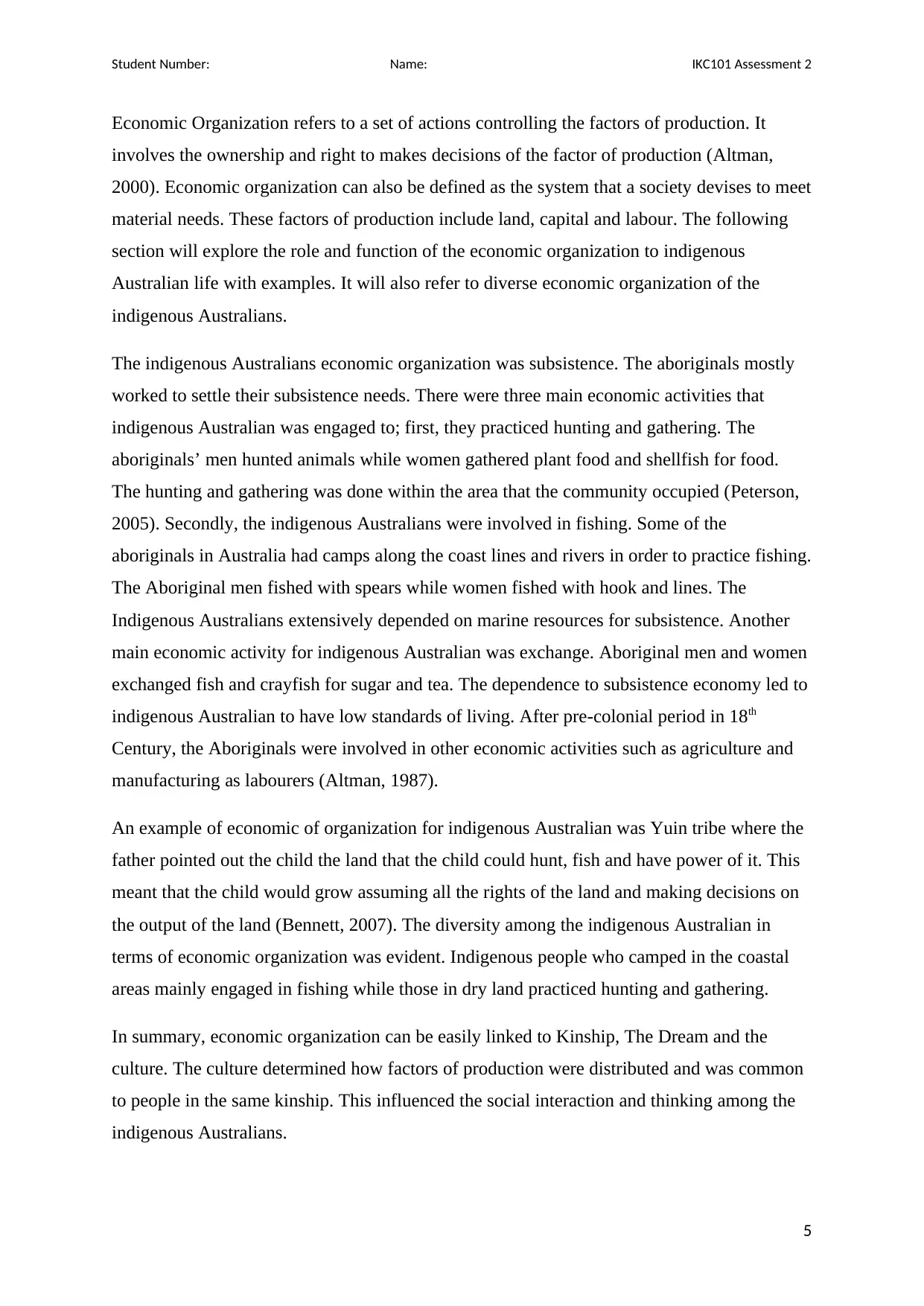
Student Number: Name: IKC101 Assessment 2
Economic Organization refers to a set of actions controlling the factors of production. It
involves the ownership and right to makes decisions of the factor of production (Altman,
2000). Economic organization can also be defined as the system that a society devises to meet
material needs. These factors of production include land, capital and labour. The following
section will explore the role and function of the economic organization to indigenous
Australian life with examples. It will also refer to diverse economic organization of the
indigenous Australians.
The indigenous Australians economic organization was subsistence. The aboriginals mostly
worked to settle their subsistence needs. There were three main economic activities that
indigenous Australian was engaged to; first, they practiced hunting and gathering. The
aboriginals’ men hunted animals while women gathered plant food and shellfish for food.
The hunting and gathering was done within the area that the community occupied (Peterson,
2005). Secondly, the indigenous Australians were involved in fishing. Some of the
aboriginals in Australia had camps along the coast lines and rivers in order to practice fishing.
The Aboriginal men fished with spears while women fished with hook and lines. The
Indigenous Australians extensively depended on marine resources for subsistence. Another
main economic activity for indigenous Australian was exchange. Aboriginal men and women
exchanged fish and crayfish for sugar and tea. The dependence to subsistence economy led to
indigenous Australian to have low standards of living. After pre-colonial period in 18th
Century, the Aboriginals were involved in other economic activities such as agriculture and
manufacturing as labourers (Altman, 1987).
An example of economic of organization for indigenous Australian was Yuin tribe where the
father pointed out the child the land that the child could hunt, fish and have power of it. This
meant that the child would grow assuming all the rights of the land and making decisions on
the output of the land (Bennett, 2007). The diversity among the indigenous Australian in
terms of economic organization was evident. Indigenous people who camped in the coastal
areas mainly engaged in fishing while those in dry land practiced hunting and gathering.
In summary, economic organization can be easily linked to Kinship, The Dream and the
culture. The culture determined how factors of production were distributed and was common
to people in the same kinship. This influenced the social interaction and thinking among the
indigenous Australians.
5
Economic Organization refers to a set of actions controlling the factors of production. It
involves the ownership and right to makes decisions of the factor of production (Altman,
2000). Economic organization can also be defined as the system that a society devises to meet
material needs. These factors of production include land, capital and labour. The following
section will explore the role and function of the economic organization to indigenous
Australian life with examples. It will also refer to diverse economic organization of the
indigenous Australians.
The indigenous Australians economic organization was subsistence. The aboriginals mostly
worked to settle their subsistence needs. There were three main economic activities that
indigenous Australian was engaged to; first, they practiced hunting and gathering. The
aboriginals’ men hunted animals while women gathered plant food and shellfish for food.
The hunting and gathering was done within the area that the community occupied (Peterson,
2005). Secondly, the indigenous Australians were involved in fishing. Some of the
aboriginals in Australia had camps along the coast lines and rivers in order to practice fishing.
The Aboriginal men fished with spears while women fished with hook and lines. The
Indigenous Australians extensively depended on marine resources for subsistence. Another
main economic activity for indigenous Australian was exchange. Aboriginal men and women
exchanged fish and crayfish for sugar and tea. The dependence to subsistence economy led to
indigenous Australian to have low standards of living. After pre-colonial period in 18th
Century, the Aboriginals were involved in other economic activities such as agriculture and
manufacturing as labourers (Altman, 1987).
An example of economic of organization for indigenous Australian was Yuin tribe where the
father pointed out the child the land that the child could hunt, fish and have power of it. This
meant that the child would grow assuming all the rights of the land and making decisions on
the output of the land (Bennett, 2007). The diversity among the indigenous Australian in
terms of economic organization was evident. Indigenous people who camped in the coastal
areas mainly engaged in fishing while those in dry land practiced hunting and gathering.
In summary, economic organization can be easily linked to Kinship, The Dream and the
culture. The culture determined how factors of production were distributed and was common
to people in the same kinship. This influenced the social interaction and thinking among the
indigenous Australians.
5
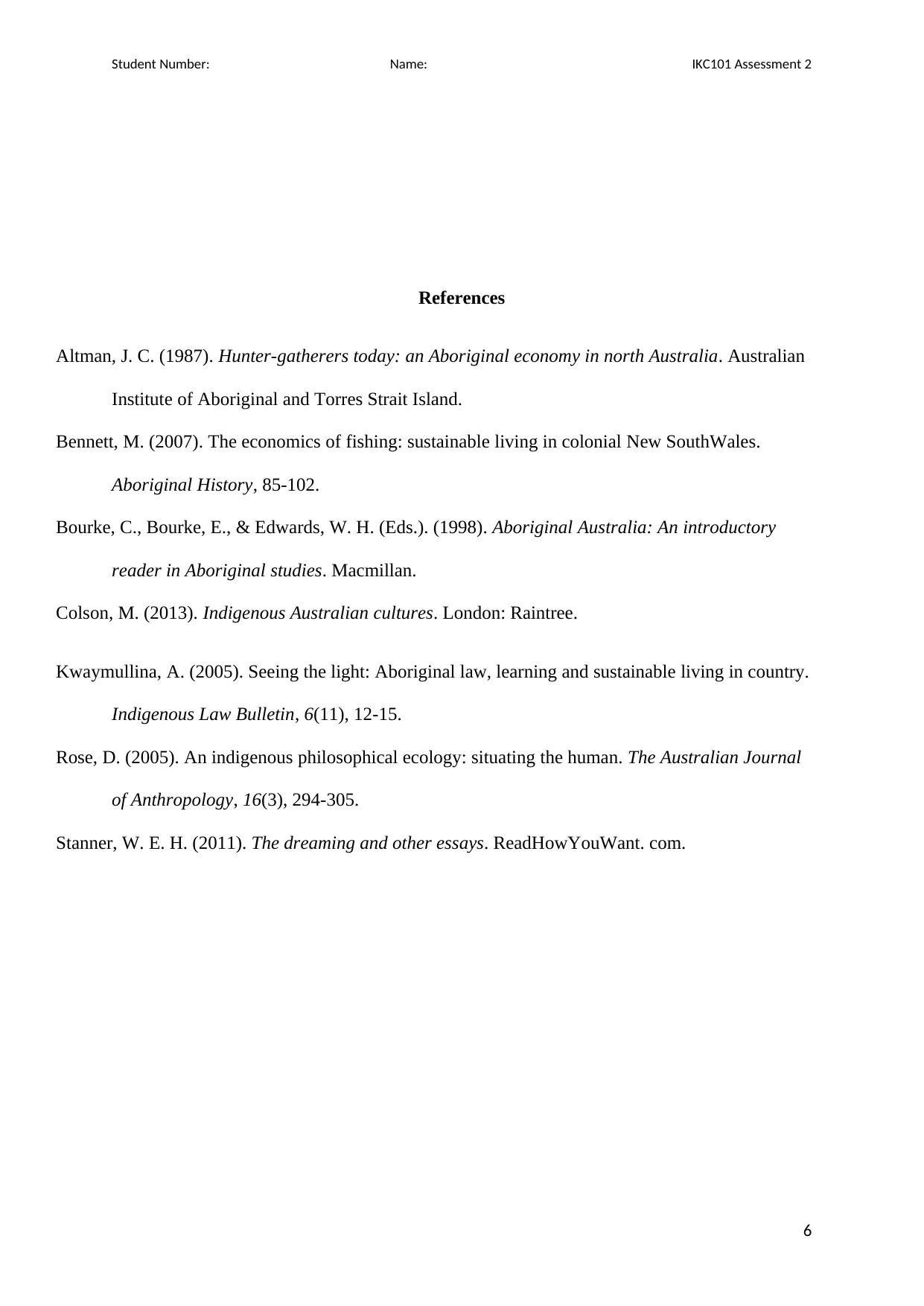
Student Number: Name: IKC101 Assessment 2
References
Altman, J. C. (1987). Hunter-gatherers today: an Aboriginal economy in north Australia. Australian
Institute of Aboriginal and Torres Strait Island.
Bennett, M. (2007). The economics of fishing: sustainable living in colonial New SouthWales.
Aboriginal History, 85-102.
Bourke, C., Bourke, E., & Edwards, W. H. (Eds.). (1998). Aboriginal Australia: An introductory
reader in Aboriginal studies. Macmillan.
Colson, M. (2013). Indigenous Australian cultures. London: Raintree.
Kwaymullina, A. (2005). Seeing the light: Aboriginal law, learning and sustainable living in country.
Indigenous Law Bulletin, 6(11), 12-15.
Rose, D. (2005). An indigenous philosophical ecology: situating the human. The Australian Journal
of Anthropology, 16(3), 294-305.
Stanner, W. E. H. (2011). The dreaming and other essays. ReadHowYouWant. com.
6
References
Altman, J. C. (1987). Hunter-gatherers today: an Aboriginal economy in north Australia. Australian
Institute of Aboriginal and Torres Strait Island.
Bennett, M. (2007). The economics of fishing: sustainable living in colonial New SouthWales.
Aboriginal History, 85-102.
Bourke, C., Bourke, E., & Edwards, W. H. (Eds.). (1998). Aboriginal Australia: An introductory
reader in Aboriginal studies. Macmillan.
Colson, M. (2013). Indigenous Australian cultures. London: Raintree.
Kwaymullina, A. (2005). Seeing the light: Aboriginal law, learning and sustainable living in country.
Indigenous Law Bulletin, 6(11), 12-15.
Rose, D. (2005). An indigenous philosophical ecology: situating the human. The Australian Journal
of Anthropology, 16(3), 294-305.
Stanner, W. E. H. (2011). The dreaming and other essays. ReadHowYouWant. com.
6
⊘ This is a preview!⊘
Do you want full access?
Subscribe today to unlock all pages.

Trusted by 1+ million students worldwide
1 out of 6
Related Documents
Your All-in-One AI-Powered Toolkit for Academic Success.
+13062052269
info@desklib.com
Available 24*7 on WhatsApp / Email
![[object Object]](/_next/static/media/star-bottom.7253800d.svg)
Unlock your academic potential
Copyright © 2020–2026 A2Z Services. All Rights Reserved. Developed and managed by ZUCOL.


